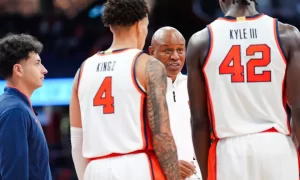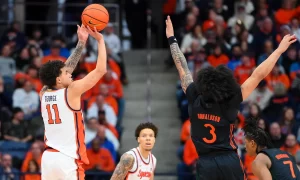A captain is much more than just a man with an armband and the right to flip a coin before the starting whistle. He is someone who is not afraid to speak up when others are silent. Someone who can gather a team when it is falling apart. Someone who hears even what is said between the lines – in silence, glances, pauses. From the basketball courts of Manila to the football fields of Cebu, it is the captain who sets the tone and shapes the character of the team. But what does a leader look like today? Let’s find out.
Core Duties of a Team Captain
The captain is not just a player with an armband. He is the voice in the locker room, the leader on the field, and the support in the most difficult moments. He will prompt in defense, shout at a mistake, but will be the first to come when you need to cheer up. It is the captain who keeps the team in good shape when the score on the scoreboard is not in their favor. He does not wait for applause – he does his job. While the fans are guessing how the next game will go, the captain is already setting his guys up for the fight. By the way, if you are one of those who follow every bet, check out online betting PH—more than a thousand options daily: from top football leagues to eSports, with live odds and tangible bonuses. Register with a promo code and get an increased welcome bonus!
Leading with Confidence and Care
Confidence is not a shout in the team circle. It’s when a new player makes a mistake, but you still give him the ball on the next attack. Real captains don’t intimidate—they inspire. Take, for example, Alyssa Valdez, captain of the Creamline Cool Smashers. She not only leads on the court, but also constantly supports the team off it. It is this balance between firmness and attention to each player that helps keep the team together as a single unit.
In Philippine volleyball, names like Valdez and Rachel Ann Dakis have become synonymous with trust. They create an atmosphere in which you want to play and win. But off the court, everyone has their way of relaxing. Some go to online casino—there are thousands of them now for every taste, from colorful slots with themes of Ancient Egypt and fantasy to classic games with live dealers. Aviator is especially popular—a fast and exciting game in which seconds can make all the difference.
Motivating the Team from Within
Motivation doesn’t always come from locker room speeches. It often comes quietly, in the details—a pat on the back. A teammate’s name yelled from the bench. Here’s how team captains drive internal fire:
- Lead by Example: June Mar Fajardo, the San Miguel Beermen center, never stops hustling. His consistency in the PBA makes others follow his energy.
- Celebrate Small Wins: Whether it’s a rookie scoring their first point or a perfect defensive play, captains highlight the moments others miss.
- Handle Slumps Wisely: Not everyone plays great every game. Captains remind teammates of their worth even during dry spells.
- Share the Spotlight: Great leaders make space for others to shine. No ego, just team.
These habits turn good teams into great ones—and keep morale high through the ups and downs.
Trust-Building On and Off the Field
Trust doesn’t just happen. It comes from training together, from shared goals – even from the silence after a tough game. In the Philippines, teams often don’t just play together, they live and train side by side. That rhythm brings people together. At Barangay Ginebra, for example, LA Tenorio has earned respect not only for his play but also for regularly hosting team dinners and helping the young guys off-camera.
This calm does not go unnoticed. It is infectious. When a leader does not panic, the rest of the team holds the line. It does not matter whether it is a title fight or just a pre-season warm-up; the captain sets the pace. And it is in such moments that it becomes clear: being a leader is not about big words, but about the ability to keep a clear head when everything is on the line.
The Captain’s Role in Conflict Moments
Not every moment on the field is smooth. Sometimes, tempers rise. Emotions boil. And someone has to step in. Captains are often the ones to de-escalate and redirect. Here’s how they manage conflicts:
- Diffuse Player Tensions: Stop arguments before they explode—often with just a word or a look.
- Mediate Coach-Team Misunderstandings: Sometimes, a coach’s frustration needs to be translated. Captains become the bridge.
- Control Group Dynamics: Jealousy, blame, or ego can appear. The captain spots it early.
- Respond to Opponent Provocations: When opponents play dirty or talk trash, the captain sets the standard: cool, calm, and focused.
It’s not about avoiding conflict. It’s about owning the moment and guiding others through it.
Staying Calm Under Pressure
Big games. The roar of the stands. The final seconds on the scoreboard. The tension is palpable in every move. But real captains? They breathe deeper, think faster, and act more precisely. Think of Scottie Thompson in the decisive moments of Ginebra games—his composure has saved the team from defeat more than once and brought them victories that later become legend.
That kind of calm doesn’t go unnoticed. It’s infectious. When a leader doesn’t panic, the rest of the team keeps the line. It doesn’t matter if they’re fighting for a title or just warming up for the season; the captain sets the pace. And it’s in moments like these that you realize: being a leader isn’t about big talk, it’s about keeping a clear head when everything is on the line.
Leadership That Leaves a Mark
Being a captain means stepping forward when it’s hardest—raising your partner’s eyes when he’s down—staying calm when everything around you is going upside down. And—most importantly—believing, even when there’s almost no chance. The true influence of a captain isn’t limited to the game. It’s felt in every handshake, in a friendly hug, in the voice of the stands. This is what makes his role truly unforgettable!
















